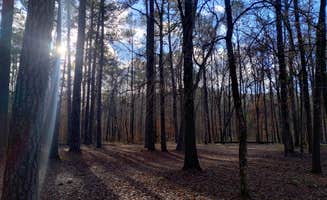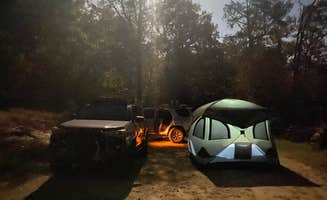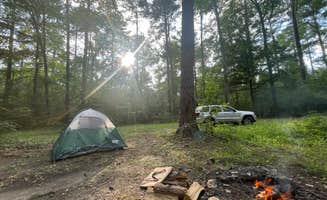Dispersed camping near Centerville, Georgia encompasses several primitive camping areas nestled within the central Georgia landscape where dense pine forests transition to deciduous trees along river corridors. Summer temperatures typically range from 70-95°F with high humidity, while winter nights can drop below freezing. Seasonal hunting activity substantially impacts camping patterns across these public lands, with camper volume decreasing during peak hunting seasons.
What to do
Creek exploration: 200 feet from the camping area at Murder Creek Parking Area, visitors can access water cascades and shoals. "Had fun walking down to the water. I suspect in the summer this area is quite the hot spot with swimmers," notes one camper. The creek features moderate flows during spring and early summer.
Wildlife viewing: Early mornings at Ocmulgee River Camp provide opportunities to observe native wildlife. "Saw some deer and a mystery black animal, maybe a boar or a bear - unsure," reports a camper who visited in December. Dawn and dusk offer optimal viewing times when animals are most active.
Hiking horse trails: Several primitive campsites connect to equestrian trail systems. "Beautiful campsite, just a few neighbors, tons of flat space and a few fire pits. There are hunters around and we heard a good deal of shots. Saw some deer on a walk," notes a visitor to Ocmulgee River Camp. Most trails remain unmaintained and unmarked, requiring navigation skills.
What campers like
Winter camping conditions: The region offers year-round primitive camping with milder winters than northern states. "It was nice and warm even in December! Almost 70 degrees!" reports a visitor to Ocmulgee River Camp. January campers note: "Open spaces and very quiet this time of the year (January) train horn in the distance and gunshots in the distance as well from hunters."
Cell service reliability: Unlike many remote camping areas, some dispersed sites maintain functional connectivity. A camper at Tyler Hunt Camp shares: "This place is a refuge. There are privately owned homes around but the folks keep to themselves. It's quiet, super dark at night and beautiful." Many sites maintain adequate Verizon coverage.
Spacious camping areas: The dispersed sites typically provide ample room between campers. "Nice open camp site with plenty of spots for camping. Only a mile off the road, which is a little bumpy but manageable," notes a visitor to Ocmulgee River Camp. Sites accommodate multiple tents with natural separation between camping areas.
What you should know
Night safety considerations: Some primitive sites experience unexpected traffic after dark. A camper at Tyler Hunt Camp reported: "I enjoyed my stay here during the day, but things changed after dark. As night fell, I began preparing for bed, but I noticed vehicles coming and going—at least three within an hour." Local advice suggests camping in groups when possible.
License requirements: Primitive camping at Rum Creek WMA requires documentation. "Must have a hunting or fishing license or a land use pass," confirms a recent visitor who rated the area 5-stars. Georgia hunting/fishing licenses cost $15 for residents and $60 for non-residents, while land use passes cost $30 annually.
Noise factors: Despite remote settings, campers should expect some background sounds. "Besides the faint traffic noise that is mostly drowned out by the waterfall noise, this place was very quiet," notes a camper at Murder Creek Parking Area. Train horns, distant gunshots during hunting seasons, and occasional vehicle traffic affect different sites to varying degrees.
Tips for camping with families
Site security selection: When camping with children, prioritize locations with minimal nighttime disruptions. "Expect to have a drive thru at least once around 9/10. It's just a see who is in the area type thing," notes a visitor to Tyler Hunt Camp, explaining ranger patrols that contribute to site safety.
Bug preparation: Humidity levels significantly impact insect activity at riverside locations. "It was quite hot but surprisingly not that buggy," notes a summer visitor to Ocmulgee River Camp. Mosquito populations peak from May through September, requiring appropriate repellents and protective clothing.
Water safety awareness: Creeks and rivers near camping areas feature variable conditions. At Murder Creek, "the shoals and water cascades" provide natural features, but water levels fluctuate seasonally. No lifeguards or safety equipment exists at any primitive sites, requiring constant supervision of children.
Tips from RVers
Ground clearance requirements: Access roads to primitive sites require appropriate vehicles. For Murder Creek Parking Area, "The lot probably does require a little clearance. So, a sedan may not be the best choice. That probably helps with traffic control on this road." Most sites remain accessible to high-clearance vans and smaller RVs under 25 feet.
Site levelness: Primitive areas offer varying terrain for parking. "Open spaces and very quiet this time of the year," notes a winter visitor to Ocmulgee River Camp, where the camping area provides multiple flat spots suitable for vans and small trailers. Bringing leveling blocks remains essential for most sites.
Turnaround space: Limited maneuvering room exists at some primitive sites. Most dispersed camping areas accommodate vehicles up to 25 feet in length, but backing into spots may be required. The mile-long access road to Ocmulgee River Camp includes limited turn-around options for larger rigs.




